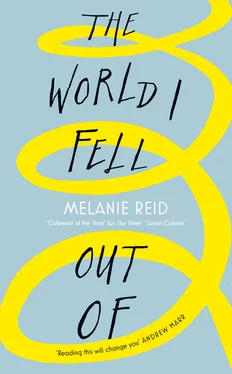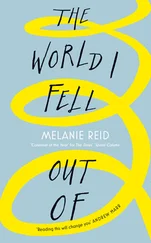‘Is the cord severed?’ I asked.
No, he said. And that was all I wanted to know. If it wasn’t severed then there was hope.
What I didn’t know was that Dave had already been taken aside and gently told to prepare for me being in a wheelchair for the rest of my life. He was to go home, this proud, tough, man’s man, and spend the next two nights howling in despair and grief. Who can comfort anyone after news like that? And how can I ever escape the guilt of loading so much pain on him and on Douglas, my son – the two people who love me most in all the world? Even now, that is a kernel of grief which nestles at the centre of my being. I did this to me. But I did it to them too.
While wider family life was in meltdown, the news rippling out, by contrast I was removed to a place of eerie, enforced calm. My first night of my new life was spent in the high dependency unit, doped to the eyeballs on opiates. ‘Serious but stable,’ said the bulletin released to my colleagues in the media. I would need a delicate operation to stabilise my neck, but my timing had been exquisitely inappropriate: just as I ploughed into the soil, Jesus was believed to be rising from the dead, everyone was on holiday, and no neurological spinal surgery would take place until Tuesday. In the meantime, with a spine unstable in two places, I must be kept totally immobile, nil by mouth, fighting nausea.
The unit was a calm, bewildering, slow-motion cocoon. The room seemed soft round the edges, orangey in colour. I lay and stared at the dinner-plate bit of ceiling available to me, listening to a deranged woman nearby, raving in broad, angry Glaswegian. All I could move were my eyeballs. Hours passed without sleep, while my brain churned with despair. I was dimly aware, though, of a kind presence forever at my shoulder, stopping me from being alone, murmuring kind words. Early in the morning, before I was transferred to the spinal unit, someone – I presumed the same nurse – spoke. ‘When you’re better, come back and see me. My name is Bridget,’ she said. The words strung themselves into a banner in my head, as fragile and as sturdy as Tibetan prayer flags. I grasped them as a lifeline. In the apricot dark, she had given me the gift of human company, connection, hope, a future. One day I would go back. It was the first positive thought I had had.
Years later, by sheer chance, I found Bridget. Who was in fact called Brenda, and it was her co-worker Kate who had sat at my shoulder all night. Morphine turns many nurses, in the perception of their patients, into the Angel of Mons, and many more, unfairly, into Nurse Ratched; but these women were special. What continues to astonish me is that they remembered me amongst the thousands of smashed-up bodies they see in a major trauma hospital.
‘You were a fairly unusual case for us,’ Kate told me. ‘You were covered in mud from your fall. But what I remember was the way you lay awake all night, just looking at the ceiling. I could see your mind turning over and over. And I remember desperately wishing I could do something to put it right, to turn back the clock for you …’ her voice trailed off ‘… but all I could do was sit beside you sponging your mouth. We washed the mud off you in the morning. And I’ve often thought about you since, wondered what happened to you.’
As I have wondered myself.
CHAPTER TWO
Put Your Finger in the Crow’s Nest
The Warden owns the shade.
LOUIS SACHAR , HOLES
An apricot-coloured world, shading to russet, was actually rather an intriguing place to inhabit. You don’t sleep, when you’re on morphine, you just travel to strange places behind your eyelids, restless journeys through an orange landscape, journeys which leave you exhausted and confused. At night, I frequently found myself at the bottom of a cave, looking up like a potholer at rock faces which were clad with thick, hand-knitted russet wool – chunky cable-stitch, knitted on a giant’s great big fat knitting needles, as if to give you hand-holds when you climbed, but I didn’t need them because I was on some kind of cherry-picker, floating effortlessly up, up, up, exploring the openings and ledges on the woolly surface. Close to, I leant in and examined the texture, the thick twists of cable stitch. Up, up, I go, high into the stifling dark of orange woolliness.
That was one of the nicer destinations to which morphine took me. Other times, when it was daylight, and I was gazing at the ceiling tiles in the ward, I saw crude graffiti had been scratched. Evil messages to me. I caught the words subliminally. Fuck off , it said. But when I trailed my eyes slowly back to look more closely, the words had disappeared. Sometimes the tiles lifted at the edges, and I saw eyes peering down at me – sometimes rats’ eyes, other times, illegal immigrants’. Somewhere, in some sane fragment of my brain, I was horrified – my illiberal subconscious was betraying me, my inner Daily Mail reader emerging. The other part of me was preoccupied with the need to tell the authorities. Surely they shouldn’t be there. Not living in the ceiling. I knew things were bad in the NHS but surely not that bad. I felt under threat. But before I could call out, express it, the morphine carried me away somewhere else, and I forgot.
For three days, over the Easter holiday weekend, I lay motionless in the high-dependency ward of the spinal unit, waiting for my surgery. They had me on a specialist spinal bed, which tilted from side to side, to relieve pressure on my skin, and I was allowed neither to eat nor drink. Every so often the nurses wet my lips with a sponge on a stick. I pleaded for water, but they could not give me any. I pleaded with them to turn my pillow, to relieve the pressure on my head, but they refused to do it as often as I would like, because the neck was unstable. It took three of them to do it – two keeping my head motionless. The other one flipping the pillow. For three days I was unaware of anything else from the real world. I don’t know if Dave was there; I drifted.
My only certainty was that the ward was a dangerous, volatile place and I was a silent witness, buffeted and bewildered by the drugs. My instinct was to hang onto consciousness and concentrate very hard on survival. My view, when I was with it enough to open my eyes, was still that bit of ceiling. Out of the dark, in the periphery of my vision, emerged a face. A tiny woman with short grey hair; a kindly, self-effacing sprite whose voice offered me a mooring. ‘I’m Christine. I’m your named nurse,’ she told me. ‘I’ll look after you now. Together, we’ll get you through this. Things are going to get better.’
The connection she made held me, steadied me, a rope to the shore. She told me she had been a spinal nurse for more than forty years; she spoke with confidence and calm optimism. When she was not there I drifted alone again, fearful. Over the time I spent in hospital, I was cared for by dozens of nurses who were, like all human beings, a mixture of sensitive and insensitive, flawed and uncannily dedicated. With all of them, I sought kindness and a connection; the essence, surely, of any benign human relationship. And with most I found it, with few it was lacking. There was no other nurse, though, who gave me utmost sanctuary in the way Christine did when I was most in need.
Days and nights merged and I was unaware.
I could not feel my body, but I sensed strongly that my legs were raised up in the air in front of me. Floating up high. Later I learnt this was a common phenomenon of a new spinal injury, because they weren’t; they were flat on the bed. The other pressing physical sensation was of a steel band tightening around my ribcage, like the hoop holding together a whisky barrel. I could feel nothing else in my torso but that band. Most peculiar. Later I discovered this was my diaphragm. Our bodies, brilliantly evolved to survive, breathe in two ways – via the intercostal muscles around the lungs, and by the action of the diaphragm. The connections for each emerge from the spinal cord at different levels, like a safety net, a fallback system: I had lost the first but retained the second. My injury had paralysed my chest muscles and I was breathing solely by the rise and fall of my diaphragm. Had the break happened a few millimetres higher, both would have been knocked out and I’d have needed a tracheotomy and a machine to breathe for me. But I didn’t know this. I knew very little. I had no skin sensation at all … could only feel my head and back of my neck on the pillow. Just to test I was alive, and to release some distress, I chewed angrily at my bottom lip, the only autonomous action left to me. Just then I vividly appreciated the attraction of self-harm. Soon I could taste blood, but felt absolutely no pain. Why wasn’t it hurting? Only much later did I realise that this was the effect of the morphine.
Читать дальше












